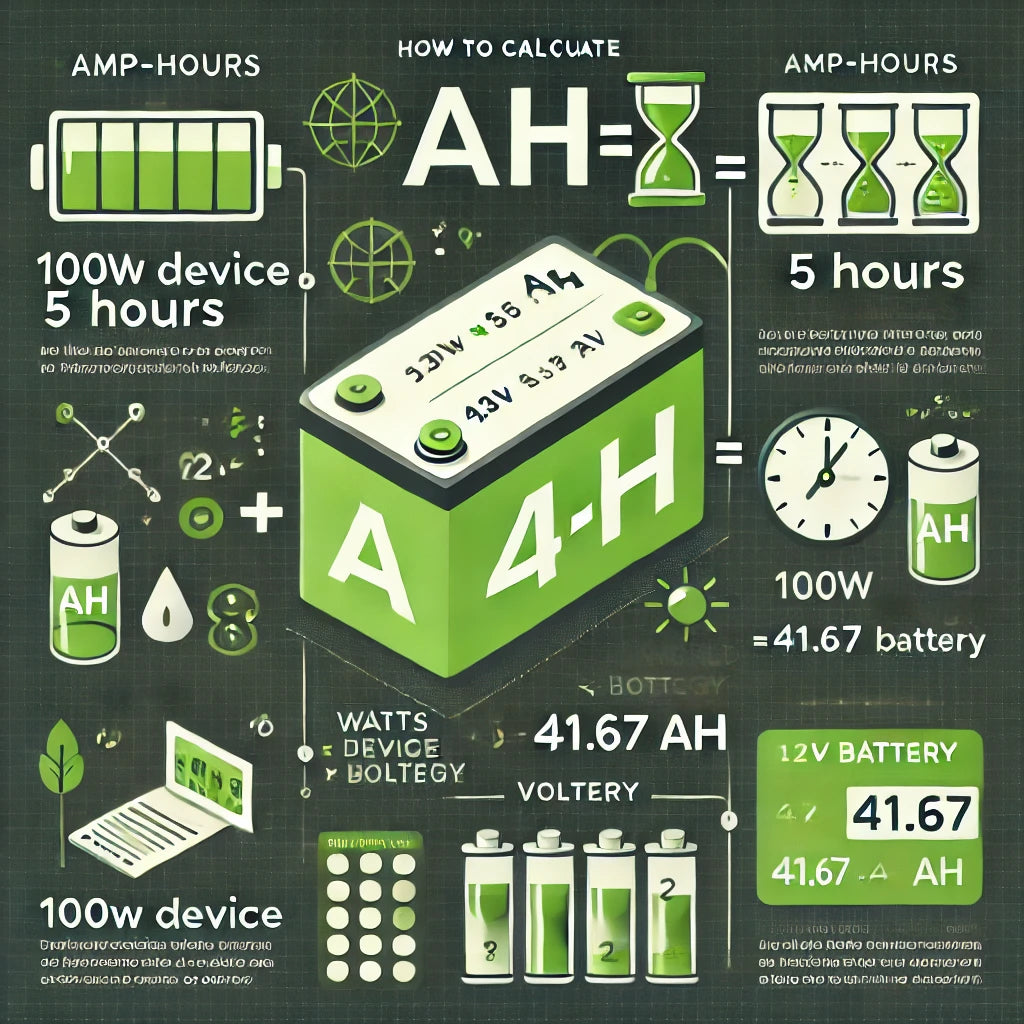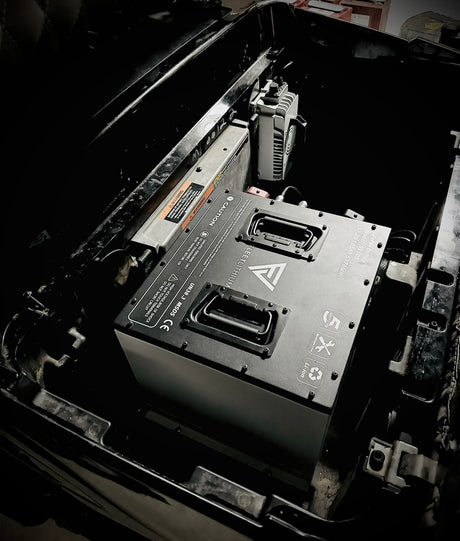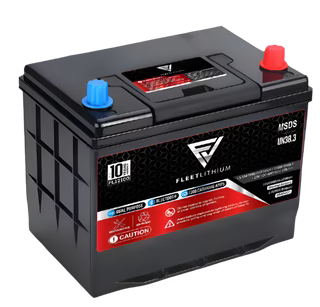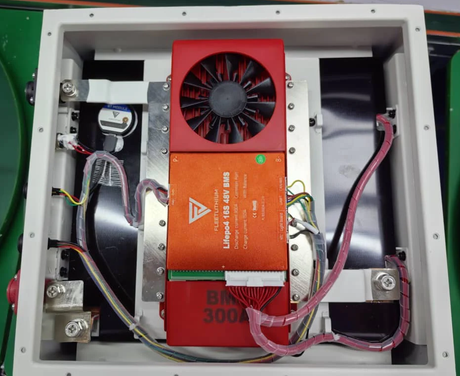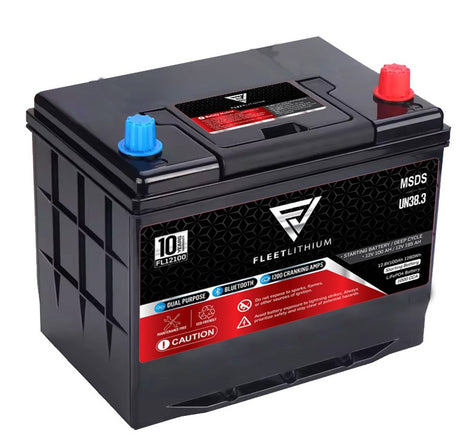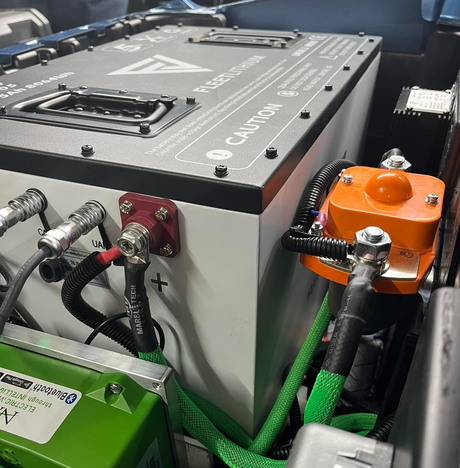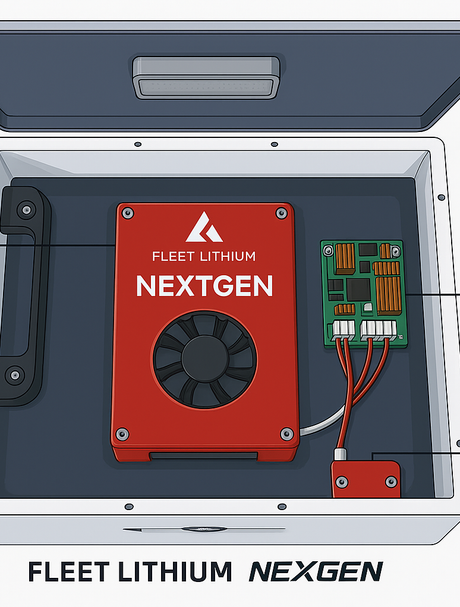How to Pick the Right Amp Hour (Ah) Rating for Fleet Lithium Batteries: A Complete Guide
When selecting a lithium-ion battery for your application, one of the most critical factors to consider is the Amp Hour (Ah) rating. The Ah rating indicates the battery’s capacity to store and deliver energy over time, and it plays a crucial role in ensuring that your system performs efficiently. Whether you’re powering an electric vehicle, solar energy system, RV, or marine vessel, choosing the right Ah rating is essential for optimal performance, longevity, and safety.
In this blog post, we will break down what Amp Hours (Ah) mean, how to determine the correct Ah rating for your application, and how Fleet Lithium’s solutions can help you make an informed choice for your energy needs.
1. What is Amp Hour (Ah)?
The Amp Hour (Ah) is a unit of measure used to describe the capacity of a battery. It essentially indicates how much energy a battery can deliver over a specified period (usually one hour). For example:
- A 10 Ah battery can theoretically supply 10 amps of current for one hour.
- A 20 Ah battery can supply 10 amps for two hours, or 20 amps for one hour.
The higher the Ah rating, the more energy the battery can store and provide, which directly affects the run time of your system.
It’s important to note that the Ah rating is influenced by factors like the type of battery (e.g., LiFePO4 from Fleet Lithium), discharge rate, and the specific application. Fleet Lithium batteries are known for their long lifespan, high energy density, and safety features, making them an excellent choice for various applications.
2. Why Does the Ah Rating Matter for Different Applications?
Choosing the right Ah rating is essential for ensuring that your battery can meet the demands of your specific application. The Ah rating determines how long a battery can provide power before needing to be recharged. Understanding this relationship is key to selecting the right battery for your needs.
Electric Vehicles (EVs) and Electric Transportation
In electric vehicles (EVs), including electric cars, bikes, and scooters, the Ah rating plays a major role in the driving range. A higher Ah rating typically means a larger battery capacity, which allows for longer trips between charges.
For example:
- A 50 Ah battery can deliver more power and sustain the vehicle for a longer period than a 20 Ah battery.
- The power requirement will vary depending on the vehicle’s motor size, weight, terrain, and driving style.
When choosing an Ah rating for an electric vehicle, calculate the daily energy usage and match it with the battery’s Ah to ensure it provides adequate driving range without being over- or under-sized.
Recreational Vehicles (RVs) and Camping
RVs and camping vehicles require batteries to power essential systems like lighting, appliances, air conditioning, and charging electronics. A larger Ah rating is crucial if you plan to use high-power devices for extended periods.
Considerations:
- A 100 Ah battery might be sufficient for light-use systems, like LED lights and small appliances.
- For off-grid living or powering more energy-demanding systems (like an air conditioner or microwave), you may need a 200 Ah or higher capacity battery.
Fleet Lithium’s LiFePO4 batteries offer long-lasting performance and can be sized to handle the power demand of your RV, ensuring that you have enough stored energy to enjoy your trip.
Solar Energy Storage Systems
In off-grid solar energy systems, the Ah rating of your battery determines how much energy you can store from your solar panels to use during periods without sunlight (e.g., at night or on cloudy days).
Factors to consider for a solar application:
- The total energy output of your solar panels (measured in watts).
- The energy usage of your household or cabin (measured in kilowatt-hours).
- How many days of autonomy (i.e., how long you can go without sun) you need.
For example, if your solar panels produce 1,000 watts per day and your daily energy consumption is 600 watt-hours, you’ll need a battery with an Ah rating that can store at least that amount of energy. For a 12V system, this would be about 50 Ah. However, to ensure sufficient autonomy (e.g., two days without sun), you would need a 100 Ah battery.
Fleet Lithium’s LiFePO4 batteries are ideal for solar energy storage due to their high energy density and long life cycles, making them perfect for both residential and commercial solar installations.
Marine Applications
Marine vessels, from sailboats to fishing boats, rely on batteries to power lighting, navigation systems, and other essential equipment. The energy demand of these systems can vary based on the size of the vessel and the power requirements.
Considerations for marine applications:
- Smaller vessels might need 50–100 Ah batteries to power basic systems like lights and GPS.
- Larger vessels, such as those with more advanced electronics, heating, and cooling systems, may require 200 Ah or higher batteries for reliable performance.
Fleet Lithium’s marine batteries provide a durable and long-lasting solution, capable of handling the rigorous power demands of marine environments.
Off-Grid and Backup Power Systems
For homes or businesses relying on backup power or off-grid systems, selecting the correct Ah rating ensures you have enough energy during power outages or when off the grid. The right battery capacity allows you to run essential appliances like refrigerators, freezers, and lights.
Example:
- A typical refrigerator consumes about 100 watts per hour. If you need to power it for 24 hours during an outage, you would need a battery capacity of at least 2.4 kWh (100 watts x 24 hours).
- For a 12V system, this translates to about 200 Ah.
Fleet Lithium batteries can help meet your off-grid or backup power needs with long-lasting, efficient storage solutions.
3. How to Calculate the Right Ah for Your Application
Choosing the right Ah rating involves understanding your power consumption and duration of use. Here’s a simple formula to help you calculate the necessary battery capacity for your application:
-
Determine your total power needs:
- Add up the wattage of the devices you intend to power. For example, if you have a 12V refrigerator (120 watts) and 12V lights (40 watts), your total wattage would be 160 watts.
-
Estimate how many hours you need to run the devices:
- If you want to run the refrigerator and lights for 5 hours, multiply the total wattage (160 watts) by the number of hours (5):
- 160 watts x 5 hours = 800 watt-hours.
- If you want to run the refrigerator and lights for 5 hours, multiply the total wattage (160 watts) by the number of hours (5):
-
Convert watt-hours to amp-hours:
- For a 12V system, divide the watt-hours by the voltage:
- 800 watt-hours ÷ 12V = 66.67 Ah.
- For a 12V system, divide the watt-hours by the voltage:
Thus, you would need a 70 Ah battery (rounding up to the nearest standard size).
4. Fleet Lithium Batteries: Perfect for All Applications
Fleet Lithium provides a range of LiFePO4 batteries designed to meet the energy storage needs of different applications. Whether you’re using a small RV, a large solar array, or an electric vehicle, Fleet Lithium has a battery solution that balances capacity, longevity, and performance.
Why choose Fleet Lithium?
- High Energy Density: Compact yet powerful batteries that store more energy in less space.
- Long Lifespan: Our LiFePO4 batteries last up to 10-15 years, making them a cost-effective choice for long-term applications.
- Safety Features: Equipped with advanced Battery Management Systems (BMS), thermal protection, and overcharge protection.
- Environmental Responsibility: We support battery recycling programs to ensure responsible disposal and sustainability.
Conclusion
Choosing the right Amp Hour (Ah) rating is essential for ensuring your battery system meets your energy needs without being over or under-sized. By calculating your power requirements based on your application, you can select a Fleet Lithium battery that offers the perfect balance of capacity, performance, and safety.
Whether you’re powering an electric vehicle, solar system, RV, or marine application, Fleet Lithium’s high-quality LiFePO4 batteries provide the reliability and efficiency you need for years to come.
Visit Fleet Lithium to explore our full range of battery solutions and find the perfect match for your application.

